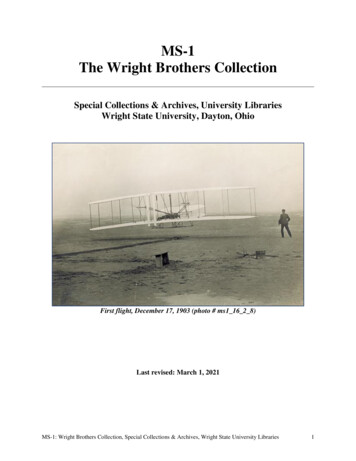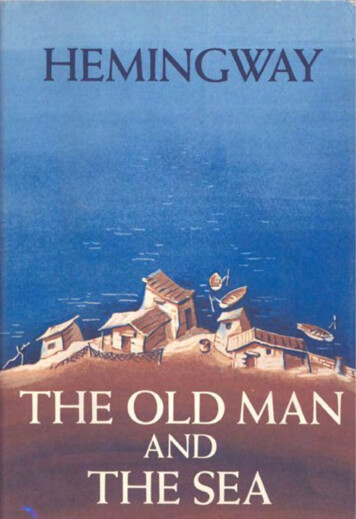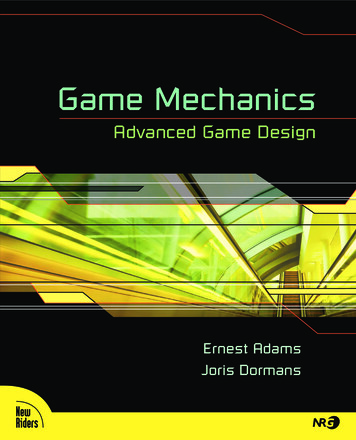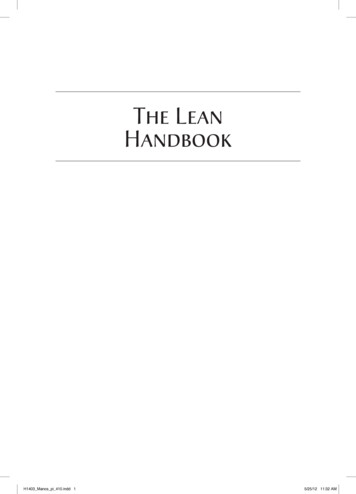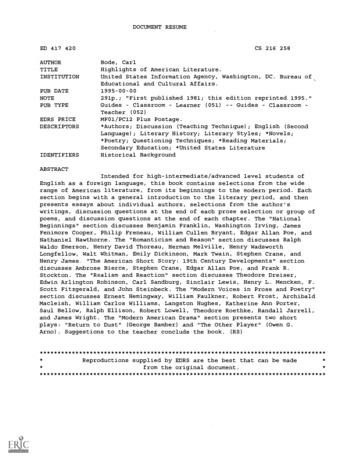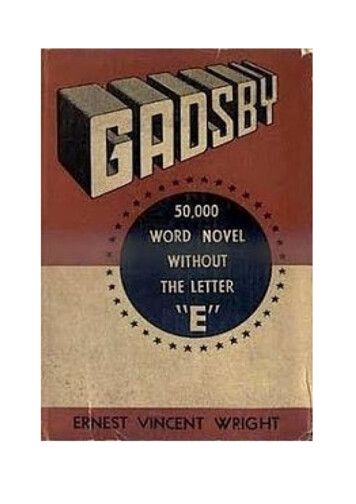
Transcription
This free e-book has been downloaded from : a story of over 50,000 words without using the letter "E"by Ernest Vincent Wright
Introduction by the Author:THE ENTIRE MANUSCRIPT of this story was written with the E type-bar of thetypewriter tied down; thus making it impossible for that letter to be printed. This wasdone so that none of that vowel might slip in, accidentally; and many did try to do so!There is a great deal of information as to what Youth can do, if given a chance; and,though it starts out in somewhat of an impersonal vein, there is plenty of thrill, rollickingcomedy, love, courtship, marriage, patriotism, sudden tragedy, a determined stand againstliquor, and some amusing political aspirations in a small growing town.In writing such a story, —purposely avoiding all words containing the vowel E, there are agreat many difficulties. The greatest of these is met in the past tense of verbs, almost all ofwhich end with “-ed.” Therefore substitutes must be found; and they are very few. Thiswill cause, at times, a somewhat monotonous use of such words as “said;” for neither“replied,” “answered” nor “asked” can be used. Another difficulty comes with theelimination of the common couplet “of course,” and its very common connective,“consequently;” which will unavoidably cause “bumpy spots.” The numerals also causeplenty of trouble, for none between six and thirty are available. When introducing youngladies into the story, this is a real barrier; for what young woman wants to have it knownthat she is over thirty? And this restriction on numbers, of course taboos all mention ofdates.Many abbreviations also must be avoided; the most common of all, “Mr.” and “Mrs.”being particularly troublesome; for those words, if read aloud, plainly indicate the E intheir orthography.As the vowel E is used more than five times oftener than any other letter, this story waswritten, not through any attempt to attain literary merit, but due to a somewhat balkynature, caused by hearing it so constantly claimed that “it can’t be done; for you cannotsay anything at all without using E, and make smooth continuity, with perfectlygrammatical construction—” so ‘twas said.Many may think that I simply “drop” the E’s, filling the gaps with apostrophes. A perusalof the book will show that this is not so. All words used are complete; are correctly spelledand properly used. This has been accomplished through the use of synonyms; and, by sotwisting a sentence around as to avoid ambiguity. The book may prove a valuable aid toschool children in English composition.People, as a rule, will not stop to realize what a task such an attempt actually is. As I wrotealong, in long-hand at first, a whole army of little E’s gathered around my desk, all eagerlyexpecting to be called upon. But gradually as they saw me writing on and on, withouteven noticing them, they grew uneasy; and, with excited whisperings amongst themselves,began hopping up and riding on my pen, looking down constantly for a chance to drop offinto some word; for all the world like sea-birds perched, watching for a passing fish! Butwhen they saw that I had covered 138 pages of typewriter size paper, they slid off onto thefloor, walking sadly away, arm in arm; but shouting back:“You certainly must have a hodge-podge of a yarn there without Us! Why, man! We are inevery story ever written, hundreds of thousands of times! This is the first time we everwere shut out!”Pronouns also caused trouble; for such words as he, she, they, them, theirs, her, herself,
myself, himself, yourself, etc., could not be utilized. But a particularly annoying obstaclecomes when, almost through a long paragraph you can find no words with which tocontinue that line of thought; hence, as in Solitaire, you are “stuck,” and must go way backand start another; which, of course, must perfectly fit the preceding context.I have received some extremely odd criticisms since the Associated Press widelyannounced that such a book was being written. A rapid-talking New York newspapercolumnist wanted to know how I would get over the plain fact that my name contains theletter E three times. As an author’s name is not a part of his story, that criticism did nothold water. And I received one most scathing epistle from a lady (woman!) denouncing meas a “genuine fake;” (that paradox being a most interesting one!), and ending by saying: —“Everyone knows that such a feat is impossible.” All right. Then the impossible has beenaccomplished; (a paradox to equal hers!) Other criticism may be directed at theIntroduction; but this section of a story also is not part of it. The author is entitled to it, inorder properly to explain his work. The story required five and a half months ofconcentrated endeavor, with so many erasures and retrenchments that I tremble as I thinkof them. Of course anybody can write such a story. All that is needed is a piece of stringtied from the E type-bar down to some part of the base of the typewriter. Then simply goahead and type your story. Incidentally, you should have some sort of a bromidepreparation handy, for use when the going gets rough, as it most assuredly will!Before the book was in print, I was freely and openly informed “there is a trick, or catch,somewhere in that claim that there is not one letter E in the entire book, after you leave theIntroduction,” Well; it is the privilege of the reader to unearth any such deception that heor she may think they can find. I have even ordered the printer not to head each chapterwith the words “Chapter 2,” etc., on account of that bothersome E in that word.In closing let me say that I trust you may learn to love all the young folks in the story, asdeeply as I have, in introducing them to you. Like many a book, it grows more and moreinteresting as the reader becomes well acquainted with the characters.Ernest Vincent WrightLos Angeles, CaliforniaFebruary, 1939A work of writing that deliberately excludes particular letters is called a lipogram.
I [To July 1906]If youth, throughout all history, had had a champion to stand up for it; to show a doubtingworld that a child can think; and, possibly, do it practically; you wouldn’t constantly runacross folks today who claim that “a child don’t know anything.” A child’s brain startsfunctioning at birth; and has, amongst its many infant convolutions, thousands of dormantatoms, into which God has put a mystic possibility for noticing an adult’s act, and figuringout its purport.Up to about its primary school days a child thinks, naturally, only of play. But many aform of play contains disciplinary factors. “You can’t do this,” or “that puts you out,”shows a child that it must think, practically or fail. Now, if, throughout childhood, a brainhas no opposition, it is plain that it will attain a position of “status quo,” as with ourordinary animals. Man knows not why a cow, dog or lion was not born with a brain on apar with ours; why such animals cannot add, subtract, or obtain from books andschooling, that paramount position which Man holds today.But a human brain is not in that class. Constantly throbbing and pulsating, it rapidlyforms opinions; attaining an ability of its own; a fact which is startlingly shown by anoccasional child “prodigy” in music or school work. And as, with our dumb animals, achild’s inability convincingly to impart its thoughts to us, should not class it as ignorant.Upon this basis I am going to show you how a bunch of bright young folks did find achampion; a man with boys and girls of his own; a man of so dominating and happyindividuality that Youth is drawn to him as is a fly to a sugar bowl. It is a story about asmall town. It is not a gossipy yarn; nor is it a dry, monotonous account, full of suchcustomary “fill-ins” as “romantic moonlight casting murky shadows down a long,winding country road.” Nor will it say anything about tinklings lulling distant folds;robins carolling at twilight, nor any “warm glow of lamplight” from a cabin window. No.It is an account of up-and-doing activity; a vivid portrayal of Youth as it is today; and apractical discarding of that worn-out notion that “a child don’t know anything.”Now, any author, from history’s dawn, always had that most important aid to writing: anability to call upon any word in his dictionary in building up his story. That is, our strictlaws as to word construction did not block his path. But in my story that mightyobstruction will constantly stand in my path; for many an important, common word Icannot adopt, owing to its orthography.I shall act as a sort of historian for this small town; associating with its inhabitants, andstriving to acquaint you with its youths, in such a way that you can look, knowingly, uponany child, rich or poor; forward or “backward;” your own, or John Smith’s, in yourcommunity. You will find many young minds aspiring to know how, and why such a thingis so. And, if a child shows curiosity in that way, how ridiculous it is for you to snap out:—“Oh! Don’t ask about things too old for you!”Such a jolt to a young child’s mind, craving instruction, is apt so to dull its avidity, as tohold it back in its school work. Try to look upon a child as a small, soft young body and arapidly growing, constantly inquiring brain. It must grow to maturity slowly. Forcing achild through school by constant night study during hours in which it should run and
play, can bring on insomnia; handicapping both brain and body.Now this small town in our story had grown in just that way:— slowly; in fact, much tooslowly to stand on a par with many a thousand of its kind in this big, vigorous nation ofours. It was simply stagnating; just as a small mountain brook, coming to a hollow, mightstop, and sink from sight, through not having a will to find a way through thatobstruction; or around it. You will run across such a dormant town, occasionally; possiblyso dormant that only outright isolation by a fast-moving world, will show it its folly. If youwill tour Asia, Yucatan, or parts of Africa and Italy, you will find many sad ruins of pastkingdoms. Go to Indo-China and visit its gigantic Ankhor Vat; call at Damascus, Baghdadand Samarkand. What sorrowful lack of ambition many such a community shows in thusdiscarding such high-class construction! And I say, again, that so will Youth growdormant, and hold this big, throbbing world back, if no champion backs it up; thusproviding it with an opportunity to show its ability for looking forward, and improvingunsatisfactory conditions.So this small town of Branton Hills was lazily snoozing amidst up-and-doing towns, asYouth’s Champion, John Gadsby, took hold of it; and shook its dawdling, flabby body untilits inhabitants thought a tornado had struck it. Call it tornado, volcano, military onslaught,or what you will, this town found that it had a bunch of kids who had wills that wouldadmit of no snoozing; for that is Youth, on its forward march of inquiry, thought andaction.If you stop to think of it, you will find that it is customary for our “grown-up” brain to castoff many of its functions of its youth; and to think only of what it calls “topics of maturity.”Amongst such discards is many a form of happy play; many a muscular activity such aswalking, running, climbing; thus totally missing that alluring “joy of living” of childhood.If you wish a vacation from financial affairs, just go out and play with Youth. Play “blindman’s buff,” “hop-scotch,” “ring toss,” and football. Go out to a charming woodland spoton a picnic with a bright, happy, vivacious group. Sit down at a corn roast; a marshmallowtoast; join in singing popular songs; drink a quart of good, rich milk; burrow into that biglunch box; and all such things as banks, stocks, and family bills, will vanish on fairy wings,into oblivion.But this is not a claim that Man should stay always youthful. Supposing that that famousSpaniard, landing upon Florida’s coral strands, had found that mythical Fountain ofYouth; what a calamity for mankind! A world without maturity of thought; without man’sfull-grown muscular ability to construct mighty buildings, railroads and ships; a worldwithout authors, doctors, savants, musicians; nothing but Youth! I can think of but asolitary approval of such a condition; for such a horror as war would not, —could notoccur; for a child is, naturally, a small bunch of sympathy. I know that boys will “scrap;”also that “spats” will occur amongst girls; but, at such a monstrosity as killings bybombing towns, sinking ships, or mass annihilation of marching troops, childhood wouldstand aghast. Not a tiny bird would fall; nor would any form of gun nor facility formanufacturing it, insult that almost Holy purity of youthful thought. Anybody whoknows that wracking sorrow brought upon a child by a dying puppy or cat, knows thatchildhood can show us that our fighting, our policy of “a tooth for a tooth,” is abominablywrong.
So, now to start our story.Branton Hills was a small town in a rich agricultural district; and having many apossibility for growth. But, through a sort of smug satisfaction with conditions of long ago,had no thought of improving such important adjuncts as roads; putting up publicbuildings, nor laying out parks; in fact a dormant, slowly dying community. Sosatisfactory was its status that it had no form of transportation to surrounding towns butby railroad, or “old Dobbin.” Now, any town thus isolating its inhabitants, will invariablyfind this big, busy world passing it by; glancing at it, curiously, as at an odd animal at acircus; and, you will find, caring not a whit about its condition. Naturally, a town shouldgrow. You can look upon it as a child; which, through natural conditions, should attainmanhood; and add to its surrounding thriving districts its products of farm, shop, orfactory. It should show a spirit of association with surrounding towns; crawl out of its lair,and find how backward it is.Now, in all such towns, you will find, occasionally, an individual born with that sort ofbrain which, knowing that his town is backward, longs to start things toward improvingit; not only its living conditions, but adding an institution or two, such as any city, big orsmall, maintains, gratis, for its inhabitants. But so forward looking a man finds that tryingto instill any such notions into a town’s ruling body is about as satisfactory as buttingagainst a brick wall. Such “Boards” as you find ruling many a small town, function fromsuch a soporific rut that any hint of digging cash from its cast iron strong box with its bigbrass padlock, will fall upon minds as rigid as rock.Branton Hills had such a man, to whom such rigidity was as annoying as a thorn in hisfoot. Continuous trials brought only continual thornpricks; until, finally, a brilliant plantook form as John Gadsby found Branton Hills’ High School pupils waking up to BrantonHills’ sloth. Gadsby continually found this bright young bunch asking:— “Aw! Why is thistown so slow? It’s nothing but a dry twig!!”“Ha!” said Gadsby; “A dry twig! That’s it! Many a living, blossoming branch all around us,and this solitary dry twig, with a tag hanging from it, on which you will find: ‘BrantonHills; A twig too lazy to grow!’”Now this put a “hunch” in Gadsby’s brain, causing him to say: “A High School pupil is nota child, now. Naturally a High School boy has not a man’s qualifications; nor has a HighSchool girl womanly maturity. But such kids, born in this swiftly moving day, think outmany a notion which will work, but which would pass our dads and granddads in colddisdain. Just as ships pass at night. But supposing that such ships should show a light inpassing; or blow a horn; or, if—if—if— By Golly! I’ll do it!”And so Gadsby sat on his blossom-bound porch on a mild Spring morning, thinking andsmoking. Smoking can calm a man down; and his thoughts had so long and so constantlyclung to this plan of his that a cool outlook as to its promulgation was not only important,but paramount. So, as his cigar was whirling and puffing rings aloft; and as groups ofbright, happy boys and girls trod past, to school, his plan rapidly took form as follows:—“Youth! What is it? Simply a start. A start of what? Why, of that most astounding of allhuman functions; thought. But man didn’t start his brain working. No. All that an adultcan claim is a continuation, or an amplification of thoughts, dormant in his youth.Although a child’s brain can absorb instruction with an ability far surpassing that of a
grown man; and, although such a young brain is bound by rigid limits, it contains acapacity for constantly craving additional facts. So, in our backward Branton Hills, I justknow that I can find boys and girls who can show our old moss-back Town Hall big-wigsa thing or two. Why! On Town Hall night, just go and sit in that room and find out justhow stupid and stubborn a Council, (put into Town Hall, you know, through popularballot!), can act. Say that a road is badly worn. Shall it stay so? Up jumps Old Bill Simpkinsclaiming that it is a townsman’s duty to fix up his wagon springs if that road is too roughfor him!”As Gadsby sat thinking thus, his plan was rapidly growing: and, in a month, was actuallystarting to work. How? You’ll know shortly; but first, you should know this John Gadsby;a man of “around fifty;” a family man, and known throughout Branton Hills for his highstandard of honor and altruism on any kind of an occasion for public good. A loyalchurchman, Gadsby was a man who, though admitting that an occasional fault in ourdaily acts is bound to occur, had taught his two boys and a pair of girls that, though folksdo slip from what Scriptural authors call that “straight and narrow path,” it will not pay torisk your own Soul by slipping, just so that you can laugh at your ability in staying out ofprison; for Gadsby, having grown up in Branton Hills, could point to many such man orwoman. So, with such firm convictions in his mind, this upstanding man was constantlystriving so to act that no complaint from man, woman or child should bring a word ofdisapproval. In his mind, what a man might do was that man’s affair only and could stainno Soul but his own. And his altruism taught that it is not difficult to find many ways inwhich to bring joy to such as cannot, through physical disability, go out to look for it; andthat only a small bit of joy, brought to a shut-in invalid will carry with it such a warmth ascan flow only from acts of human sympathy.For many days Gadsby had thought of ways in which folks with a goodly bank accountcould aid in building up this rapidly backsliding town of contribution could do? In thistown, full of capitalists and philanthropists contributing, off and on, for shipping warmingpans to Zulus, Gadsby saw a solution. In whom? Why, in just that bunch of bright, happyschool kids, back from many a visit to a city, and noting its ability in improving its livingconditions. So Gadsby thought of thus carrying an inkling to such capitalists as to how thisstagnating town could claim a big spot upon our national map, which is now shown onlyin small, insignificant print.As a start, Branton Hills’ “Daily Post” would carry a long story, outlining a list of factorsfor improving conditions. This it did; but it will always stay as a blot upon high minds andproud blood that not a man or woman amongst such capitalists saw, in his plan, any callfor dormant funds. But did that stop Gadsby? Can you stop a rising wind? Hardly. SoGadsby took into council about forty boys of his vicinity and built up an Organization ofYouth. Also about as many girls who had known what it is, compulsorily to pass up manya picnic, or various forms of sport, through a lack of public park land. So this strong,vigorous combination of both youth and untiring activity, avidly took up Gadsby’s plan;for nothing so stirs up a youthful mind as an opportunity for accomplishing anything thatadults cannot do. And did Gadsby know Youth? I’ll say so! His two sons and girls, now inHigh or Grammar school, had taught him a thing or two; principal amongst which wasthat all-dominating fact that, at a not too far distant day, our young folks will occupy
important vocational and also political positions, and will look back upon this, our day;smiling kindly at our way of doing things. So, to say that many a Branton Hills “King ofCapital” got a bit huffy as a High School stripling was proving how stubborn a rich man isif his dollars don’t aid so vast an opportunity for doing good, would put it mildly! Suchdownright gall by a half-grown kid to inform him; an outstanding light on Branton Hills’tax list, that this town was sliding down hill; and would soon land in an abyss of nationaloblivion! And our Organization girls! How Branton Hills’ rich old widows and plumpmatrons did sniff in disdain as a group of High School pupils brought forthstraightforward claims that cash paving a road, is doing good practical work, but, in fillingup a strong box, is worth nothing to our town.Oh, that class of nabobs! How thoroughly Gadsby did know its parsimony!! And howthoroughly did this hard-planning man know just what a constant onslaught by Youthcould do. So, in about a month, his “Organization” had “waylaid,” so to say, practicallyhalf of Branton Hills’ cash kings; and had so won out, through that commonly known“pull” upon an adult by a child asking for what plainly is worthy, that his mail broughtnot only cash, but two rich landlords put at his disposal, tracts of land “for any form ofoccupancy which can, in any way, aid our town.” This land Gadsby’s Organizationpromptly put into growing farm products for gratis distribution to Branton Hills’ poor;and that burning craving of Youth for activity soon had it sprouting corn, squash, potato,onion and asparagus crops; and, to “doll it up a bit,” put in a patch of blossoming plants.Naturally any man is happy at a satisfactory culmination of his plans and so, as Gadsbyfound that public philanthropy was but an affair of plain, ordinary approach, it did notcall for much brain work to find that, possibly also, a way might turn up for puttinghandicraft instruction in Branton Hills’ schools; for schooling, according to him, did notconsist only of books and black-boards. Hands, also should know how to constructvarious practical things in woodwork, plumbing, blacksmithing, masonry, and so forth;with thorough instruction in sanitation, and that most important of all youthful activity,gymnastics. For girls such a school could instruct in cooking, suit making, hat making,fancy work, art and loom-work; in fact, about any handicraft that a girl might wish tostudy, and which is not in our standard school curriculum. But as Gadsby thought of sucha school, no way for backing it financially was in sight. Town funds naturally, should carryit along; but town funds and Town Councils do not always form what you might call synonymous words. So it was compulsory that cash should actually “drop into his lap,”via a continuation of solicitations by his now grandly functioning Organization of Youth.So, out again trod that bunch of bright, happy kids, putting forth such plain,straightforward facts as to what Manual Training would do for Branton Hills, that manysaw it in that light. But you will always find a group, or individual complaining that suchthings would “automatically dawn” on boys and girls without any training. Old BillSimpkins was loud in his antagonism to what was a “crazy plan to dip into our townfunds just to allow boys to saw up good wood, and girls to burn up good flour, trying tocook biscuits.” Kids, according to him, should go to work in Branton Hills’ shoppingdistrict, and profit by it.“Bah! Why not start a class to show goldfish how to waltz! I didn’t go to any such school;and what am I now? A Councilman! I can’t saw a board straight, nor fry a potato chip; but
I can show you folks how to hang onto your town funds.”Old Bill was a notorious grouch; but our Organization occasionally did find a totallyvarying mood. Old Lady Flanagan, with four boys in school, and a husband many daystoo drunk to work, was loud in approval.“Whoops! Thot’s phwat I calls a grand thing! Worra, worra! I wish Old Man Flanagan hadhad sich an opporchunity. But thot ignorant old clod don’t know nuthin’ but boozin’,tobacca shmokin’ and ditch-diggin’. And you know thot our Council ain’t a-payin’ for noditch-scoopin’ right now. So I’ll shout for thot school! For my boys can find out how to fixthot barn door our old cow laid down against.”Ha, ha! What a circus our Organization had with such varying moods and outlooks! But,finally such a school was built; instructors brought in from surrounding towns; andGadsby was as happy as a cat with a ball of yarn.As Branton Hills found out what it can accomplish if it starts out with vigor and a will towin, our Organization thought of laying out a big park; furnishing an opportunity forsmall tots to romp and play on grassy plots; a park for all sorts of sports, picnics, and soforth; sand pots for babyhood; cozy arbors for girls who might wish to study, or talk. (Youmight, possibly, find a girl who can talk, you know!); also shady nooks and winding pathsfor old folks who might find comfort in such. Gadsby thought that a park is truly a mostimportant adjunct to any community; for, if a growing population has no out-door spot atwhich its glooms, slumps and morbid thoughts can vanish upon wings of sunlight, amidstbright colorings of shrubs and sky, it may sink into a grouchy, faultfinding, squabblinggroup; and making such a showing for surrounding towns as to hold back any gain inpopulation or valuation. Gadsby had a goodly plot of land in a grand location for a parkand sold it to Branton Hills for a dollar; that stingy Council to lay it out according to hisplans. And how his Organization did applaud him for this, his first “solo work!”But schools and parks do not fulfill all of a town’s calls. Many minds of varying kinds willlong for an opportunity for finding out things not ordinarily taught in school. So BrantonHills’ Public Library was found too small. As it was now in a small back room in our HighSchool, it should occupy its own building; down town, and handy for all; and withadditional thousands of books and maps. Now, if you think Gadsby and his youthfulassistants stood aghast at such a gigantic proposition, you just don’t know Youth, as it istoday. But to whom could Youth look for so big an outlay as a library building would cost?Books also cost; librarians and janitors draw pay. So, with light, warmth, and all-roundcomforts, it was a task to stump a full-grown politician; to say nothing of a plain, ordinarytownsman and a bunch of kids. So Gadsby thought of taking two bright boys and twosmart girls to Washington, to call upon a man in a high position, who had got it throughBranton Hills’ popular ballot. Now, any politician is a convincing orator. (That is, youknow, all that politics consists of!) and this big man, in contact with a visiting capitalist,looking for a handout for his own district, got a donation of a thousand dollars. But thatwouldn’t start a public library; to say nothing of maintaining it. So, back in Branton Hills,again, our Organization was out, as usual, on its war-path.Branton Hills’ philanthropy was now showing signs of monotony; so our Organizationhad to work its linguistic ability and captivating tricks full blast, until that thousanddollars had so grown that a library was built upon a vacant lot which had grown nothing
but grass; and only a poor quality of it, at that; and many a child and adult quickly foundways of profitably passing odd hours.Naturally Old Bill Simpkins was snooping around, sniffing and snorting at any signs ofmaking Branton Hills “look cityish,” (a word originating in Bill’s vocabulary.)“Huh!! I didn’t put in any foolish hours with books in my happy childhood in this goodold town! But I got along all right; and am now having my say in its Town Hall doings.Books!! Pooh! Maps! BAH!! It’s silly to squat in a hot room squinting at a lot of print! If youwant to know about a thing, go to work in a shop or factory of that kind, and find outabout it first-hand.”“But, Bill,” said Gadsby, “shops want a man who knows what to do without having tostop to train him.”“Oh, that’s all bosh! If a boss shows a man what a tool is for; and if that man is any good,at all, why bring up this stuff you call training? That man grabs a tool, works ‘til noon;knocks off for an hour; works ‘til —”At this point in Bill’s blow-up an Italian Councilman was passing, and put in his oar, with:“Ha, Bill! You thinka your man can worka all right, firsta day, huh? You talka crazy somuch for my boota! You lasta just a half hour. Thisa library all righta. This town too muchawhat I call tight-wad!”Oh, hum!! It’s a tough job making old dogs do tricks. But our Organization was nowholding almost daily sittings, and soon a bright girl thought of having band music in thatnow popular park. And what do you think that stingy Council did? It actually built a mostfantastic band-stand; got a contract with a first-class band, and all without so much as aCouncilman fainting away!! So, finally, on a hot July Sunday, two solid hours of grandharmony brought joy to many a poor Soul who had not for many a day, known that balmof comfort which can “air out our brains’ dusty corridors,” and bring such happy thrills, asMusic, that charming Fairy, which knows no human words, can bring. Around that gaudyband-stand, at two-thirty on that first Sunday, sat or stood as happy a throng of old andyoung as any man could wish for; and Gadsby and his “gang” got hand-clasps and handclaps, from all. A good band, you know, not only can stir and thrill you; for it can play asoft crooning lullaby, a lilting waltz or polka;
twisting a sentence around as to avoid ambiguity. The book may prove a valuable aid to school children in English composition. People, as a rule, will not stop to realize what a task such an attempt actually is. As I wrote along, in long-hand at first, a whole army of little E’s gathered around my desk,




